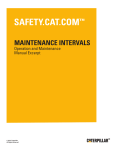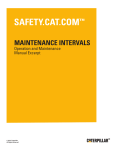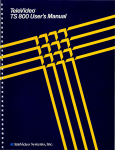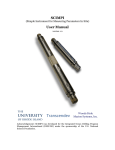Download MAINTENANCE INTERVALS - Safety
Transcript
MAINTENANCE INTERVALS Operation and Maintenance Manual Excerpt © 2010 Caterpillar All Rights Reserved ® ® SEBU7345-02 January 2003 Operation and Maintenance Manual H45/H45s, H50/H50s, 63/H63/H63s, 70/70s/H70/H70s, H90C/H90Cs and 100/H100/H100s Hydraulic Hammers 6CZ1-Up (H45/H45s) 5MZ1-Up (H50/H50s) 4GL1-121 (63) 4GL122-Up (H63/H63s) 4KL1-1029 (70/70s) 4KL1030-Up (H70/H70s) 6TZ1-Up (H90C/H90Cs) 4ML1-158 (100) 4ML159-Up (H100/H100s) 39 Maintenance Section Maintenance Interval Schedule i01866383 Maintenance Interval Schedule SMCS Code: 6700-041; 7519 Every 2 Service Hours or 4 Times Daily Work Tool - Lubricate ............................................ 40 Initial 50 Service Hours Mounting Bracket Bolts - Tighten .......................... 41 Side Plate Bolts - Tighten ..................................... 42 Every 50 Service Hours or Weekly Hydraulic Fittings - Inspect ................................... Tool - Inspect ........................................................ Tool - Remove and Install ..................................... Tool Retaining Pins - Inspect/Replace .................. Tool Bushing (Upper) - Inspect/Replace ............... Tool Bushing (Lower) - Inspect/Replace ............... 41 45 46 47 48 48 Every 1000 Service Hours or 1 Year Work Tool - Inspect/Recondition ........................... 40 40 Maintenance Section Work Tool - Inspect/Recondition i01858219 Work Tool - Inspect/ Recondition SMCS Code: 6333-020; 6333-040; 6700-020; 6700-040 All of the seals in the hammer must be replaced on a yearly schedule. At this time, the membrane for the accumulator must also be replaced. Inspect all of the wear parts. You must replace all of the damaged parts or the parts that are worn. You must make sure that the accumulator is charged to the correct pressure. Refer to the Service Manual, “Specifications, Disassembly and Assembly, and the Systems Operation, Testing and Adjusting” Sections for information on the hammer. i01866472 Work Tool - Lubricate SMCS Code: 6700-086 NOTICE Failure to apply down pressure on the hammer tool during lubrication could result in piston seal failure. This seal failure will allow oil to leak from the hammer tool. To avoid seal damage, always apply down pressure on the hammer tool during lubrication. Note: Before you install the hammer tool, the tool shank must be well lubricated. Illustration 37 g00675000 Note: The fittings have been marked with the decal that is shown in Illustration 37. 2. Apply 10 to 15 strokes from the grease gun to the tool bushings and the hammer tool. Caterpillar Impact Products Limited strongly recommends the use of 130-6951 Grease for all applications on the hydraulic hammers. Refer to the Operation and Maintenance Manual, “Lubricating Grease” for more information. 3. If the hammer is equipped with an automatic lubrication system, check the hammer tool for a collar of grease. The collar of grease must be completely around the hammer tool. If the collar of grease is too large or the collar of grease is too small, refer to the Service Manual, “Testing and Adjusting” for information about setting the timer. Refer to the Operation and Maintenance Manual, “Automatic Lubrication” for more information on the automatic lubrication system. Adjust the intervals and the amount of grease to the wear rate of hammer tool and to the working conditions. Lack of grease or improper grease will cause the following problems: • Abnormal wear of the tool bushing and the hammer tool • Broken hammer tool Illustration 36 g00676898 1. Lubricate the hammer. There is one fitting on the H45, H45s, H50and the H50s. There are two fittings on the 63, H63, H63s, 70, 70s, H70, H70s, H90C, H90Cs, 100, 100s, H100, and the H100s. 41 Maintenance Section Hydraulic Fittings - Inspect i01273608 Hydraulic Fittings - Inspect SMCS Code: 5057-040-X6 5. You must repair any damaged parts or worn parts before you operate the hammer. You must replace any damaged parts or worn parts before you operate the hammer. You must repair any leaks before you operate the hammer. i01866452 Personal injury or death can result from improperly checking for a leak. Always use a board or cardboard when checking for a leak. Escaping air or fluid under pressure, even a pin-hole size leak, can penetrate body tissue causing serious injury, and possible death. If fluid is injected into your skin, it must be treated immediately by a doctor familiar with this type of injury. Mounting Bracket Bolts Tighten SMCS Code: 7079-527-BK; 7079-527-BC Check the bolts for the mounting bracket. If necessary, tighten the bolts to the proper torque value. Refer to the following tables for the proper torque value. Illustration 39 Illustration 38 g00677053 Typical example of hydraulic fittings 1. Check the hydraulic fittings (1) and (3) for damage or leaks. 2. Check the connector lines (2) for damage or for wear. 3. Check the supply hoses for damage or wear. 4. Check all of the clamps on the boom and all of the clamps on the stick of the host machine. g00678912 The typical example that is shown is for the following machines: • Excavator • Backhoe loader 42 Maintenance Section Side Plate Bolts - Tighten Table 12 Sales Model Bolt (1) Bolt Torque H45, H45s, H50, H50s, 70s, H70s, H90Cs, 100, 100s 8T-4141 or 8T-4187 530 ± 70 N·m (391 ± 52 lb ft) 63, H63, H63s, 70, H70, H90C 7X-2554 270 ± 40 N·m (199 ± 30 lb ft) H100, H100s 7X-2454 900 ± 100 N·m (663 ± 74 lb ft) g00677890 Illustration 41 Example of a non-silenced hammer Table 14 g00680645 Illustration 40 Mounting bracket for skid steer loaders (2) Bolts to mount H45, H45s, H50, and H50s (3) Bolts to mount H63, and H63s Torque Values for the bolts on Non-Silenced Hammers Sales Model Bolt (1) Torque H45 8T-4193 240 ± 40 N·m (177 ± 30 lb ft) H50 8T-4141 340 ± 60 N·m (251 ± 44 lb ft) 63, H63 7X-2575 580 ± 100 N·m (428 ± 74 lb ft) 70, H70 7X-2577 580 ± 100 N·m (428 ± 74 lb ft) H90C 7X-2581 1150 ± 200 N·m (848 ± 148 lb ft) 100, H100 7X-2583 1150 ± 200 N·m (848 ± 148 lb ft) Table 13 Sales Model H45, H45s, H50, H50s Bolt (2) Bolt (3) 530 ± 70 N·m (391 ± 52 lb ft) 8T-4141 63, H63, H63s Bolt Torque 7X-2554 270 ± 40 N·m (199 ± 30 lb ft) i01585135 Side Plate Bolts - Tighten SMCS Code: 6333-079-BC Inspect the bolts for the side plates for the proper torque. If necessary, tighten the bolts to the proper torque. Refer to the following illustrations and the following tables for the proper torque value. (2) Tighten the nuts for the threaded rod to a torque value of 100 ± 20 N·m (74 ± 15 lb ft). Use this torque value for all side plates that are equipped with a threaded rod. Use the threaded rod to help with the alignment of the side plates and the mounting bracket. 43 Maintenance Section Side Plate Bolts - Tighten g00677934 Illustration 42 g00677987 Illustration 43 Example of a silenced housing Example of a H70 Pin-On hammer Table 15 Table 16 Torque Values for Silenced Hammers Sales Model H45s, H50s Bolt (1) Torque 8T-1447 175 ± 30 N·m (129 ± 22 lb ft) H63s, 70s, H70s 9X-2404 340 ± 60 N·m (251 ± 44 lb ft) H90Cs, H100s 7Y-5215 580 ± 100 N·m (428 ± 74 lb ft) Torque Values for Pin-On Side Plates Sales Model Bolt (1) 70, H70 7X-2576 70, H70 Bolt (2) Torque 580 ± 100 N·m (428 ± 74 lb ft) 7X-2575 580 ± 100 N·m (428 ± 74 lb ft) 44 Maintenance Section Side Plate Bolts - Tighten g00678005 Illustration 44 g00678006 Illustration 45 Example of H70s Pin-On hammer Example of a H90C Pin-On hammer Table 17 Table 18 Torque Values for Pin-On Side Plates Sales Model 70s, H70s Bolt (3) Torque 9X-2404 340 ± 60 N·m (251 ± 44 lb ft) Torque Values for Pin-On Side Plates Sales Model Bolt (4) H90C 7X-2580 H90C Bolt (5) Torque 1150 ± 200 N·m (848 ± 148 lb ft) 7X-2575 580 ± 100 N·m (428 ± 74 lb ft) 45 Maintenance Section Tool - Inspect 2. If necessary, grind the burrs off the hammer tool. Make sure that you remove the burrs from the notch for the retaining pin. Remove the burrs from the retaining pin. g00678194 Illustration 47 3. Check the hammer tool for wear. When you measure the wear of the tool, you must measure the part of the tool (A) that is in the tool bushings. 4. Measure the dimension (B). Example of a H100 Pin-On hammer 5. Refer to the Table 20 for the dimension of a new tool. Refer to the Table 20 for the minimum diameter of a tool. Table 19 Table 20 g00678007 Illustration 46 Wear Limits for Hammer Tools Torque Values for Pin-On Side Plates Sales Model Diameter of New Tool Minimum Diameter of Tool H45, H45s 45.0 mm (1.77 inch) 43.0 mm (1.69 inch) H50, H50s 50.0 mm (1.99 inch) 48.0 mm (1.89 inch) H63, H63s 63.0 mm (2.48 inch) 61.0 mm (2.40 inch) H70, H70s 70.0 mm (2.76 inch) 68.0 mm (2.68 inch) Tool - Inspect H90C, H90Cs 84.0 mm (3.31 inch) 82.0 mm (3.23 inch) SMCS Code: 6826-040 H100, H100s 95.0 mm (3.74 inch) 93.0 mm (3.66 inch) Sales Model Bolt (6) H100 7X-2583 H100 Bolt (7) Torque 1150 ± 200 N·m (848 ± 148 lb ft) 7X-2576 580 ± 100 N·m (428 ± 74 lb ft) i01866450 Note: You must use caution when you touch the hammer tool. The hammer tool can be extremely hot after the hammer tool has been in operation. 1. Remove the tool from the hammer. Refer to the Operation and Maintenance Manual, “Tool Remove and Install”. 6. You must replace the tool if dimension (B) is smaller than the minimum diameter of the tool for your hammer. Note: Do not weld on a hammer tool. Welding on the hammer tool causes cracks in the hammer tool. The cracks will cause the hammer tool to fail. 46 Maintenance Section Tool - Remove and Install 7. Inspect the hammer tool for cracks. If there are cracks in the hammer tool, you must replace the hammer tool. i01866444 Tool - Remove and Install SMCS Code: 6826-010 Illustration 48 g00678536 Note: Use caution when you remove the hammer tool. The tool can be very hot after the tool has been in operation. 1. Position the hammer on level ground. 2. Put the host machine’s transmission in neutral. The parking brake should be engaged. 3. Stop the engine. 4. Remove the split pin or cotter pins (1). There can be one split pin or cotter pin on each side of the hammer. The following hydraulic hammers use one pin: H45, H45s, 63, H63, and H63s. All of the other hydraulic hammers use two pins. 5. Remove the buffer or the buffers (4). 6. Remove the retaining pin or retaining pins for the tool (3). 7. If necessary, use a suitable lifting device to remove the tool. Refer to the Table 21 for the weight of the tool. Remove the hammer tool (2). 47 Maintenance Section Tool Retaining Pins - Inspect/Replace Table 21 Weights of Small Hammer Tools H45 H45s H50 H50s 63 H63 H63s 70 70s H70 H70s 100 H100 H100s H90C H90Cs 43 kg (95 lb) Blunt Tool Chisel Tool 5 kg (11 lb) 8 kg (18 lb) Long Chisel Moil Tool 5 kg (11 lb) 7 kg (15 lb) Long Moil Tool 15 kg (33 lb) 20 kg (44 lb) 324 kg (75 lb) 46 kg (101 lb) 18 kg (40 lb) 23 kg (51 lb) 37 kg (81 lb) 55 kg (121 lb) 15 kg (33 lb) 20 kg (44 lb) 33 kg (73 lb) 44 kg (97 lb) 18 kg (40 lb) 23 kg (51 lb) 37 kg (81 lb) 53 kg (117 lb) Parallel Spade Tool 5 kg ( 11 lb) 7 kg (15 lb) 13 kg (29 lb) 19 kg (42 lb) 34 kg (75 lb) 39 kg (85 lb) Transverse Spade Tool 5 kg ( 11 lb) 7 kg (15 lb) 13 kg (29 lb) 19 kg (42 lb) 34 kg (75 lb) 39 kg (85 lb) Compacting Plate 21 kg (46 lb) 23 kg (51 lb) 30 kg (66 lb) 54 kg (119 lb) 8. After you remove the tool, inspect the lower tool bushing for wear. Refer to the Operation and Maintenance Manual, “Tool Bushing (Lower) Inspect/Replace” for information on inspecting the bushing. 5. Install the buffer or buffers (4). 6. Install the split pin or the split pins (1). i01570377 9. After you remove the tool, inspect the upper tool bushing for wear. Refer to the Operation and Maintenance Manual, “Tool Bushing (Upper) Inspect/Replace” for information on inspecting the bushing for the following hydraulic hammers: 90, H90C, and H90Cs. Tool Retaining Pins Inspect/Replace SMCS Code: 6826-040; 6826-510 10. After you have removed the tool, inspect the hammer tool for wear. Refer to the Operation and Maintenance Manual, “Tool - Inspect” for information on inspecting the hammer tool. 11. After you have removed the tool, inspect the seal in the lower tool bushing for wear. You must replace the seal if the seal is worn or if the seal is damaged. Installation of Tool 1. Clean the hammer tool (2) and lubricate the hammer tool (2) with grease. Coat the sides of the tool with grease. Do not place any grease on the top of the tool. 2. Clean the pins (3). Clean the buffers (4). Lubricate the pins (3) with grease. 3. Install the hammer tool (2) and align the grooves of the tool with the pin bores. 4. Install the retaining pin or retaining pins (3). Illustration 49 g00815523 1. Remove the pin from the hammer. 2. Inspect the pin for wear or for cracks. 3. Measure the amount of wear. Compare Dimension (D1) to Dimension (D2). The difference between Dimension (D1) and Dimension (D2) must be less than 1.0 mm (0.04 inch). If the difference is greater than 1.0 mm (0.04 inch), you must replace the pin. 48 Maintenance Section Tool Bushing (Upper) - Inspect/Replace 4. If the pin is cracked, you must replace the pin. i01570752 Tool Bushing (Upper) Inspect/Replace (H90C/H90Cs and H100/H100s Only) Table 22 Specifications for Upper Tool Bushing for H90C, H90Cs, 100, 100s, H100, and H100s Sales Model Minimum Distance (A) Maximum Diameter (B) H90C, H90Cs 28 mm (1.10 inch) 86 mm (3.4 inch) 100, 100s, H100, H100s 38 mm (1.50 inch) 97 mm (3.8 inch) SMCS Code: 6826-040-GY; 6826-528 1. Remove the hammer tool. Inspect the hammer tool. Refer to Operation and Maintenance Manual, “Tool (Hammer) - Inspect”. 2. Remove the lower tool bushing. Inspect the lower tool bushing. Refer to Operation and Maintenance Manual, “Tool Bushing (Lower) Inspect/Replace”. 6. If the upper tool bushing has any damage, you must replace the bushing. If the upper tool bushing has any cracks, you must replace the bushing. If the upper tool bushing does not meet the dimensions in Table 22, you must replace the bushing. 7. Coat all of the outer surfaces of the upper tool bushing with 5P-3931 Anti-Seize Compound. Install the upper tool bushing into the head. 3. Remove the upper tool bushing. 4. Inspect the upper tool bushing for excessive wear. Inspect the upper tool bushing for damage. 8. Coat all of the outer surfaces of the lower tool bushing with 5P-3931 Anti-Seize Compound. Install the lower tool bushing into the head. 9. Coat the sides of the hammer tool that contact the tool bushings with grease. Install the hammer tool into the tool bushings. i01670115 Tool Bushing (Lower) Inspect/Replace SMCS Code: 6826-040-GY; 6826-528 1. Remove the tool. Refer to Operation and Maintenance Manual, “Tool - Remove and Install” for information on the procedure to remove the tool from your hammer. 2. Clean the inside of the bushing. Inspect the inside bore of the bushing for wear. Illustration 50 g00815770 5. Measure Dimension (A). Dimension (A) is from the top of the tool to the top of the tool bushing. You must use a Caterpillar hammer tool for the measurement. Measure Dimension (B). Refer to Table 22 for the acceptable dimensions. Illustration 51 g00678377 49 Maintenance Section Tool Bushing (Lower) - Inspect/Replace 3. You must replace the bushing if the bushing has too much wear. Refer to Table 23 for the dimensions. Table 23 Tool Bushing (Lower) Wear Limits Sales Model Maximum Dimension (A) H45, H45s 47 mm (1.8 inch) H50, H50s 52 mm (2.0 inch) 63, H63, H63s 65 mm (2.5 inch) 70, 70s, H70, H70s 72 mm (2.8 inch) H90C, H90Cs 86 mm (3.4 inch) 100, 100s, H100, H100s 97 mm (3.8 inch) Illustration 53 g00862982 Note: Do not apply 5N-5561 Silicone Lubricant to the bore of the front head. a. Refer to Illustration 53. If you have previous lower tool (3), remove O-ring seal (2) from groove (5). Do not replace the O-ring seal. Silicone sealant will replace O-ring seal (2). b. Apply a thin layer of 5N-5561 Silicone Lubricant (6) on the outer surface of lower tool bushing (3). Refer to Illustration 53 for applying the silicone sealant. Illustration 52 g00678426 In order to remove the bushing, you must perform the following steps: 1. Remove the split pins (1). There are two split pins. There is one pin on each side of the bushing. 2. Slide the bushing (3) from the head. 3. Inspect the seal (4) and inspect the O-ring (2). Replace the seal if the seal is damaged. Replace the O-ring if the O-ring is damaged. 4. If the lower tool bushing has been removed from the front head, you must perform the following steps before you install the lower tool bushing. Illustration 54 g00862983 c. Apply grease (8) to the bore of front head (7). Grease will prevent corrosion and seizures. The removal of the lower tool bushing will be made easier by applying grease. Refer to Illustration 54. d. Install the lower tool bushing before the sealant hardens. Install the split pins.



















